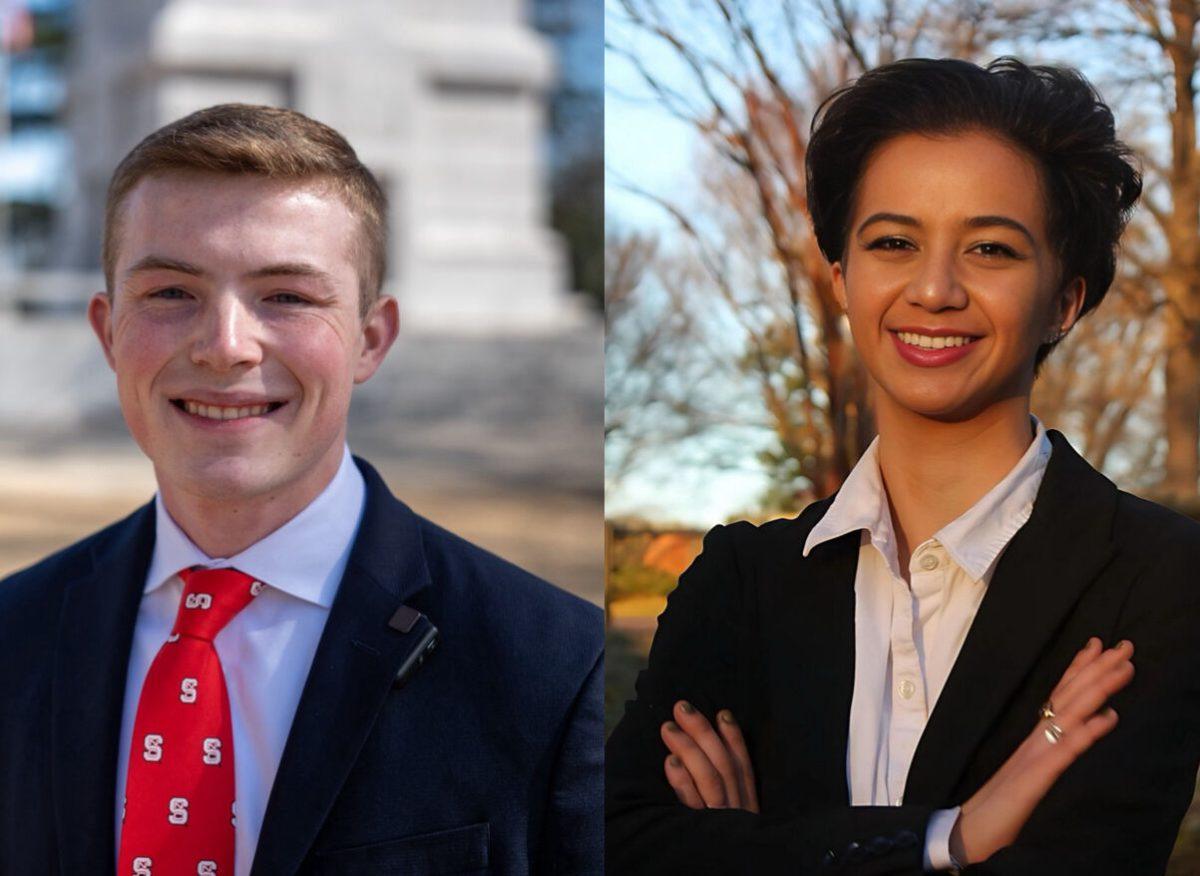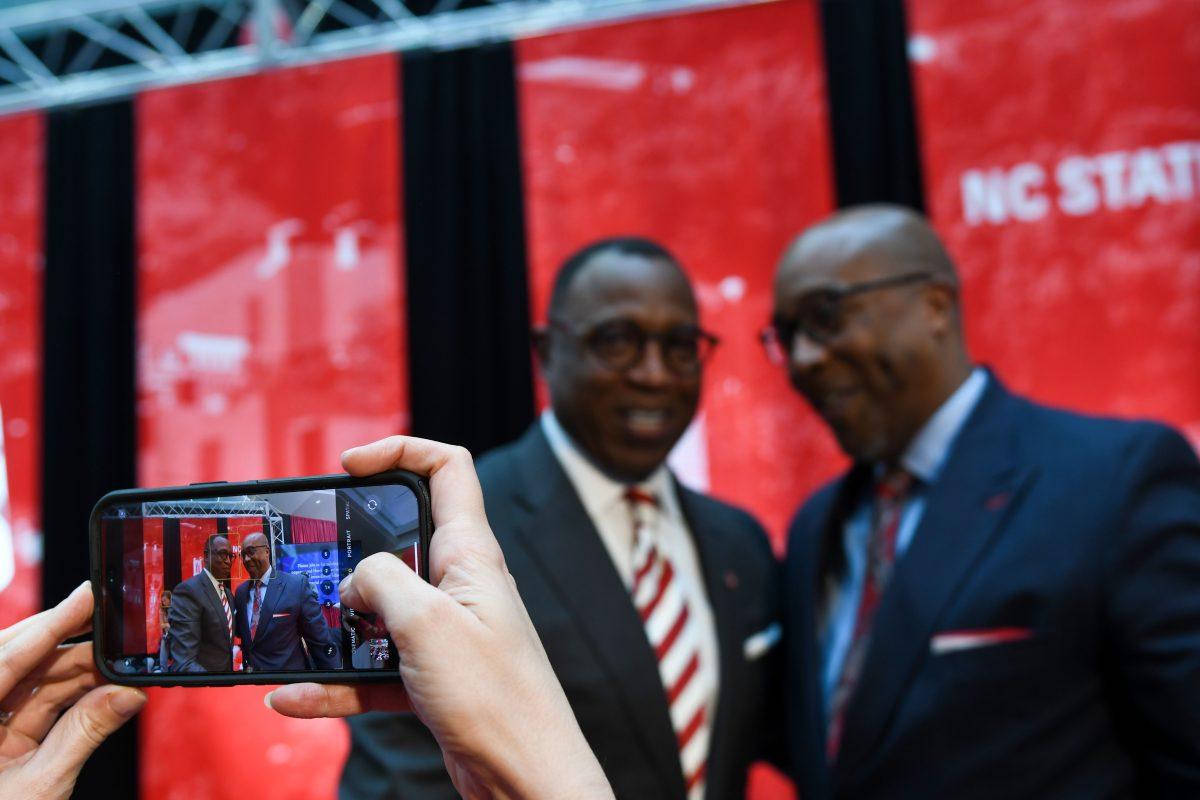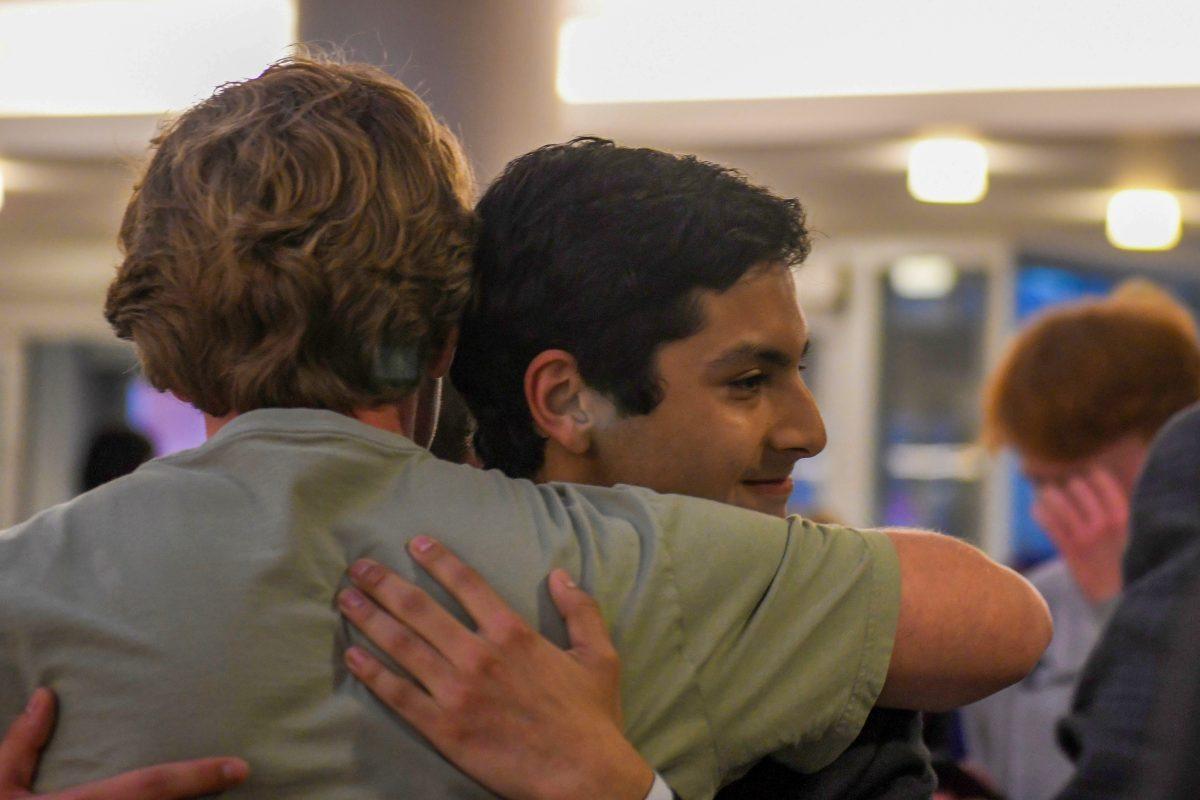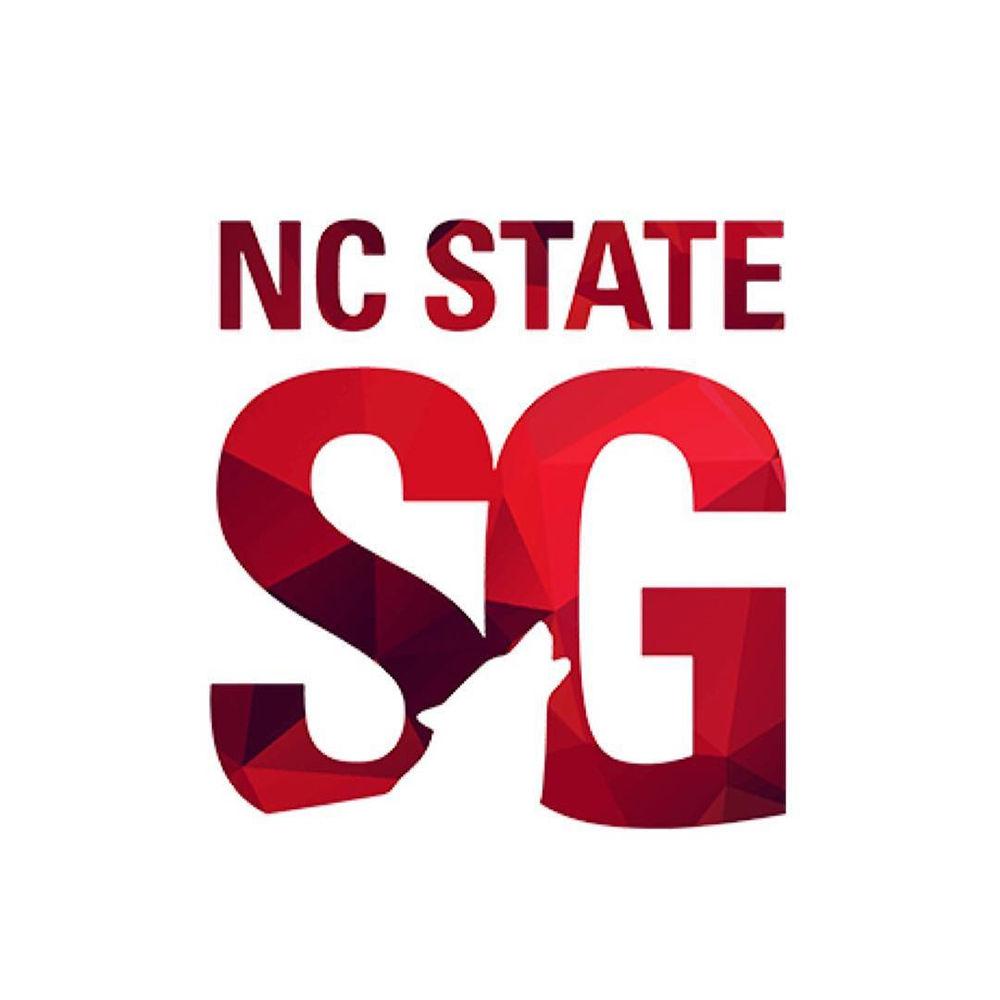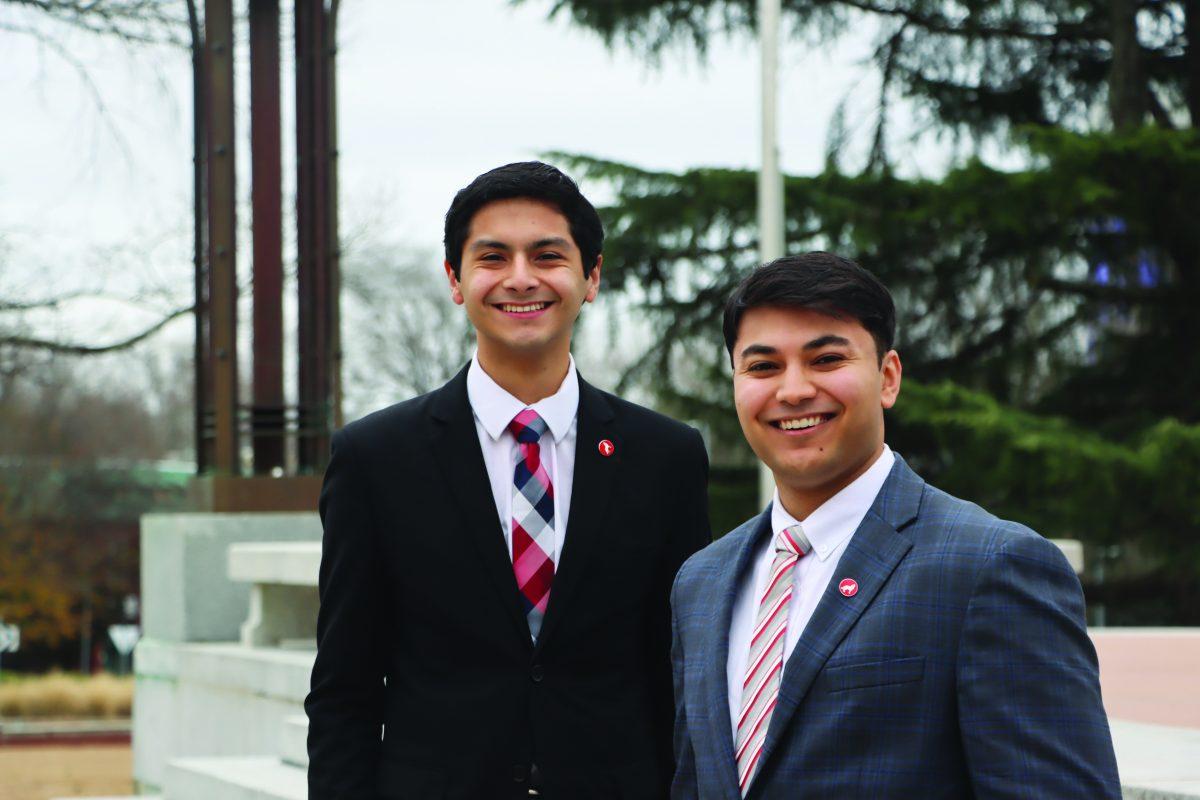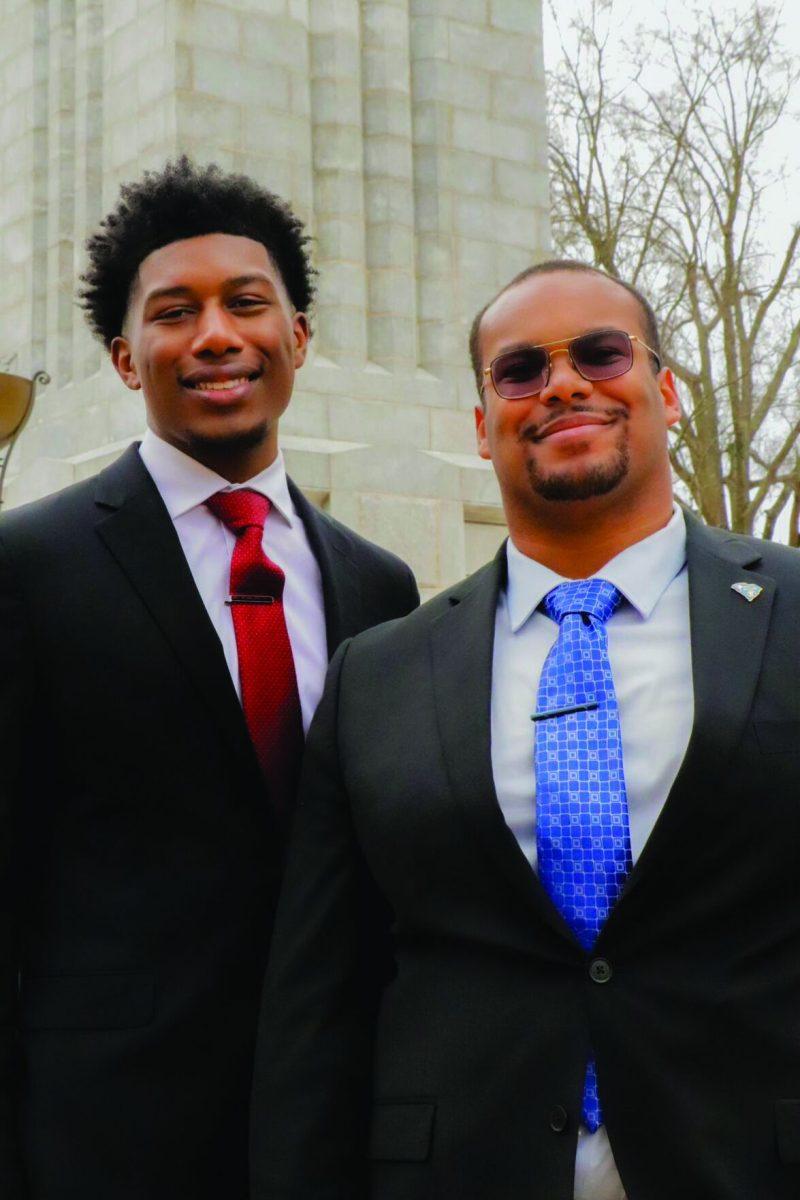Candidates for Student Senate president answered questions about student involvement, mental health and transparency at the first Student Senate president debate.
Caroline Miranda, a second-year studying physics and Student Senate president pro tempore, and Justin Pittman, a third-year studying political science and current student senator for the College of Humanities and Social Sciences, are candidates who participated in the debate that followed after the campaign fair.
The debate was organized into three sections; the first contained questions regarding Student Senate functions, the second round included platform questions and the third round allowed Student Media to ask questions specific to each candidate.
Moderators asked the candidates how they plan to effectively advocate for the entire Senate while addressing student concerns.
Pittman said a way to help address student concerns was by letting the Student Senate have its own agenda which would allow them to connect with students for aspects they need.
“As Senate president, I’m gonna serve as a bridge for senators, not as a barrier,” Pittman said. “I will use my influence to connect people to resources around campus and within our student government.”
Miranda said students will have input through an action plan that aims to help connect students to resources and administrators and understand that a resolution might not be the first step to addressing students’ concerns.
Moderators asked how the candidates plan to work and recruit underrepresented delegations and marginalized communities.
Miranda said using their own experiences and listening to others will help them succeed in representing everyone while advocating in connections with other organizations on campus.
“I think that’s something that past sessions that we have encountered, was waiting for other students and members of the body that weren’t part of student government to come to us,” Miranda said. “I would like to work on that active advocate advocating in connection by reaching to organizations working for campus senators, making sure that the information is out there and accessible that way. So folks of all backgrounds and abilities to surface in the body.”
Pittman said diversity can only be reached and celebrated once the entire Senate is filled.
“Do not celebrate that until all 72 seats are full,” Pittman said. “That’s how we make sure all backgrounds and all communities are heard at NC State.”
Moderators asked what strategies the candidates would implement to help senators pass laws while maintaining an impact.
Pittman said to be a strong Senate president, you have to impose fairness. He said he plans to do so by not serving as a barrier to legislative concerns and hearing what his fellow senators have to say.
Miranda said they are open to advice from fellow senators and have started to develop a select committee to provide resources to help student senators understand how to write and develop skills for legislation.
Moderators asked the candidates about something they accomplished in the 103 session that portrays their leadership skills.
Miranda said their leadership skills have been present through a cumulation of everything accomplished within Student Government through all three branches available to all students.
“This is something that requires a lot of coordination between all three branches and the nuanced understanding of what students have learned throughout the entire session, as well as understanding [and] reminding people that it’s a collaborative effort,” Miranda said
Pittman said he wrote GB 87: Standing Department on Campus Services Act which establishes and continues relationships with campus services such as campus police, dining, transportation and facilities.
In the second section of the night, moderators asked specific platform questions to each of the candidates. The candidate who did not answer had an opportunity to respond and ask a question.
Moderators asked Miranda how they plan to balance motivating students while incorporating mental health.
Miranda said the student part of student government comes first and a collaborative bridge will help implement the function of the Student Senate.
Pittman responded and said one of the pillars of his campaign is to promote change through innovation of filling the Senate for work to be divided.
“That’s why we filled the Senate with 72 senators, not with 50 senators or not the 63 senators. When you have 72 senators, you can divide the work of a lot more. You can walk more than you can with less senators,” Pittman said.
Pittman asked Miranda why the senate of only 63 senators was not filled to 72 during Miranda’s second-in-line presidency.
Miranda said accessibility was the number one part of gaining participation in the Senate through forms and fast response times.
Moderators asked Pittman about the specific pillars of his campaign and how having tradition as one of them is beneficial to Student Government and the student body.
Pittman said tradition is what unites students and that can play a role in how the Senate functions.
“Not just the wolf, a wolf pack. I will use my influence as Senate president to uphold the traditions to the best of my ability,” Pittman said.
Miranda also had the opportunity to respond and said tradition allows the student body to unite and grow from learning from mistakes.
Miranda asked what specific traditions Pittman wanted to keep and create within the Senate.
Pittman said that working with administrators to uphold traditions is vital to help students and senators create innovation.
Moderators asked Miranda how they plan to navigate obstacles of communication with students and the Student Government.
Miranda said increasing University communications through staff, students and organizations on campus is their biggest goal.
“Understanding within my role as pro tempore, I worked with the staff and faculty segments and that gives me a lot of insight into how the University works as a whole and understanding and asking those questions,” Miranda said.
Pittman also had the opportunity to answer and said that transparency is an important part of reaching students and is shown through his work with GB 87.
Pittman asked what Miranda would do on day one of navigating obstacles of communication.
Miranda said the University Council and connections within will help aid communication errors.
“One of the most influential sort of aspects that the Senate president is able to be a part of something called University Council, and that is a collaboration, regular meeting of folks that are from all areas across the campus,” Miranda said. “And understanding that making those connections is so so important.”
Moderators asked Pittman how he plans to incorporate all communities within Student Government, specifically multicultural and service-oriented organizations.
Pittman said he is here to work with the students and implementing an open door policy will reach all organizations.
“I want to say to students that I work for you; that’s what I’m doing,” Pittman said. “I don’t care who you work for, with what frat you’re in, what sorority, what political group you’re affiliated with. Come see. I’m here to work for you.”
Miranda responded and said their connections with other campus centers and organizations on campus will aid in an open policy.
Miranda asked how Pittman plans to reach organizations outside of his own identity.
Pittman said he does not look at identity when it comes to organizations and sees every member of NC State as one identity, the Wolfpack.
“Well, the first thing I’m not going to look at is your identity,” Pittman said. “I’m not going to look at their identity or anything when I’m working with them. That does not matter.”
Voting for Student Senate President begins March 4 and ends March 5


